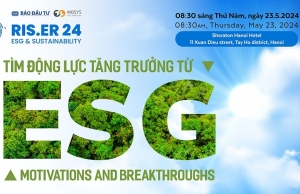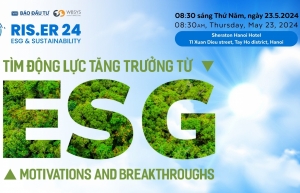Willingness to pay more for green products: a challenge for young people
At a workshop titled “Green Technology: Touchpoint for Sustainable Solutions” organised last week by the University of Economics Ho Chi Minh City (UEH) in collaboration with WorldBaseSys (WBS), Thanh Tam, a 20-year-old student majoring in logistics at UEH, shared that despite being interested in sustainable living, due to a lack of stable income, she and many other young people are quite hesitant to purchase environmentally friendly products.
“Some young people nowadays use ‘green products’ just to ‘follow the trend’, once the trend is over, the ‘green’ aspect is over too. Young people also enjoy shopping based on preferences and have not completely thought about whether the product is truly ‘green’ or not,” Tam shared.
According to the Ministry of Industry and Trade, the demand for green products in Vietnam is expected to grow by an average of 15 per cent per year. According to data released by Nielsen Vietnam in 2023, around 31 per cent of consumers are willing to pay a higher price to purchase environmentally friendly products.
Tran Le Hung, an expert from the Vietnam Institute for Development Strategies under the Ministry of Planning and Investment and director of Global Hedge Consulting, stated, “Environmentally friendly products with a higher price tag are a challenge but also an opportunity to change consumer perceptions and behaviours. To reach out to the younger generation, businesses need to provide transparent information about the production process, helping consumers to trust the products more.”
 |
| Nguyen Bach Viet, a representative from Microtec Vietnam. Photo: WBS |
Nguyen Bach Viet, a representative from Microtec Vietnam, stated that the younger generation serves as both a creative workforce and a consumer power that will have a strong impact on the future market.
“The younger generation will play a pioneering role in changing consumer perceptions and driving businesses to transition to sustainable models,” Viet said.
According to Viet, if young consumers support and are willing to pay for green products, it will be a motivating factor to drive brands towards more sustainable changes. On the other hand, manufacturers should also have strategies to influence and change the perceptions of younger consumers.
Many universities now have intellectual property centres that foster technology innovation, encouraging students to undertake green research projects aimed at sustainable development.
Also at the workshop, a group of students from the Institute of Intelligent and Interactive Technologies, University of Economics Ho Chi Minh City, had the opportunity to present two research projects to the audience: an Automatic Fruit Vending Machine and an Automatic Bubble Tea Vending Machine, with the goal of reducing plastic waste and minimising raw material wastage.
Around the world, some countries have started to attach carbon footprint labels on green products, providing consumers with additional information before making purchases.
 |
| UEH students presented the Automatic Bubble Tea Vending Machine project. Photo: WBS |
According to TUV Rheinland Vietnam, a provider of inventory and certification of carbon footprint services, as well as one of the businesses accompanying RIS.ER Hub, carbon footprint inventory and certification are currently conducted at three levels: corporate level (CCF), product level (CFP), and project level.
Businesses will face various challenges in selecting the appropriate methods for calculating and reporting carbon footprints that align with their objectives and legal requirements.
The workshop “Green Technology: Touchpoint for Sustainable Solutions” is part of the RIS.ER Hub’s “Green Touchpoint” connection activities initiated by WBS.
RIS.ER Hub aims to create an ecosystem of sustainable development businesses in multiple fields, with the goal of becoming a catalyst for businesses to recover and grow through commitments to sustainable growth, compliance with environmental protection standards, and participation in fair trade standards.
RIS.ER also provides opportunities to access green investment sources, thereby promoting sustainable thinking within the business community.
What the stars mean:
★ Poor ★ ★ Promising ★★★ Good ★★★★ Very good ★★★★★ Exceptional
 Tag:
Tag:
Related Contents
Latest News
More News
- Trung Nam-Sideros River consortium wins bid for LNG venture (January 30, 2026 | 11:16)
- Vietnam moves towards market-based fuel management with E10 rollout (January 30, 2026 | 11:10)
- Envision Energy, REE Group partner on 128MW wind projects (January 30, 2026 | 10:58)
- Vingroup consults on carbon credits for electric vehicle charging network (January 28, 2026 | 11:04)
- Bac Ai Pumped Storage Hydropower Plant to enter peak construction phase (January 27, 2026 | 08:00)
- ASEAN could scale up sustainable aviation fuel by 2050 (January 24, 2026 | 10:19)
- 64,000 hectares of sea allocated for offshore wind surveys (January 22, 2026 | 20:23)
- EVN secures financing for Quang Trach II LNG power plant (January 17, 2026 | 15:55)
- PC1 teams up with DENZAI on regional wind projects (January 16, 2026 | 21:18)
- Innovation and ESG practices drive green transition in the digital era (January 16, 2026 | 16:51)


























 Mobile Version
Mobile Version